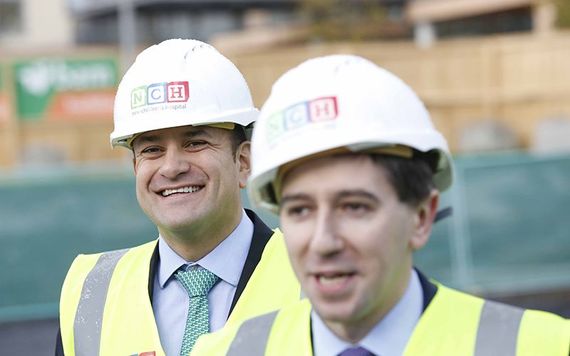One of the hallmarks of the Irish state is our apparent inability to control the cost of public projects or to properly regulate pay levels for state workers.
We have a long history of this -- during the boom, for example, it was not unusual for a new motorway or bridge to end up costing twice the original contract price. And various groups of workers on the state payroll were given huge hikes in pay by holding the country to ransom with strike threats.
The answer to any difficulty was always to throw money at the problem, as though the state finances were a bottomless pit. If there were cost overruns or huge pay demands, not to worry, it was only state money and the state could always borrow
We all know where that attitude got us. But have we learned our lesson?
Much to the anger of taxpayers, it is now happening again, the latest example being in the health sector with the financial fiasco that is our new National Children's Hospital. Plus there is a series of one-day nationwide strikes by nurses who are demanding a 12 percent hike in pay.
Read more: Ireland’s National Children’s Hospital will accidentally be the most expensive in the world
We will come back to the nurses, for whom there is some sympathy given the work they do, even though their case for such a big pay rise is questionable. But there is no sympathy for those involved in the building of the new children's hospital where the projected cost has soared from €637 million in 2016 to €1.7 billion now, and fears that it will be well over €2 billion by the time it is finished in 2023. On a per bed basis, this would make it the most expensive hospital ever built anywhere in the world.
The saga of our efforts to build a new children's hospital -- to replace the disjointed facilities for sick children we now have -- defies belief. It's been running for years, with various proposals and sites put forward. In fact, we've been waiting for it for so long that although there were serious misgivings about the site chosen beside an existing hospital in Dublin, there was relief that the present government was finally going to make it happen.
And that political desperation to get it done may be part of the problem. When the location beside St. James's Hospital in the city was decided, it was partly on the basis of an estimate by that hospital in 2012 that it would cost less than €300 million.
This knocked other hospitals out of the running, even though it was always unrealistic. When the go-ahead was given in 2016 the estimate from the main board set up to oversee the project had grown to €637 million, but exactly what that included was unclear.
Read more: Irish nurses continue strikes, gear up for National Rally in Dublin
By 2017, the estimate had jumped to €938 million but that was still clouded in uncertainty. Part of the problem is that there were no less than three boards and two other bodies involved in managing the project, making it harder to know exactly who was responsible for what. The danger of buck-passing and cost control falling between the cracks increased.
Another problem was the decision to create a two-stage contract process for the project, the first being site clearance, excavation and foundations and the second being the construction of the building itself. In theory, this was supposed to be more cost effective but it was always ridiculous. Why would a contractor come in and build on (and therefore take responsibility for) foundations provided by another company?
When the tendering for the first stage got underway, the successful company, BAM, was far cheaper than its rivals and secured the job on that basis. The big pricing gap might have raised suspicions, but failed to do so.
Having got in and with massive excavations underway, BAM was then able to secure the contract for the second stage. It did so on the basis of much-increased costs for stage two and there are now allegations that the company has a history of securing major projects in this way.
Whether that is true or not, the revised overall estimate when the stage two contract was approved two months ago had risen to €1.43 billion. So the overall cost had grown from €637 million in 2016 to €1.43 billion at the end of last year, meaning that it had more than doubled in two years. And as we said above, there are fears that this will increase to well over €2 billion by the time all the electronic and medical equipment is installed.
We are now being told, for example, that the €1.43 billion figure reached two months ago did not include a single computer. Another €300 million is expected to be spent fitting out the hospital with ICT equipment which means that the current estimate for the total cost is over €1.7 billion.
Which is why the final total is expected to be over €2 billion when other high tech aspects of the new hospital are eventually included. If that is true -- and there is every reason to believe it is likely -- that means the cost of the hospital could be over three times the estimate when the project got the go-ahead two years ago
Despite the huge public outcry this has generated, it is still hard to find a coherent explanation for how this fiasco has happened. Under pressure, the Minister for Health Simon Harris has commissioned the international management consultancy PwC to do a report on what has gone wrong (which is going to cost half a million euro!)
Both Harris and Taoiseach Leo Varadkar says there will be "accountability,” whatever that means. This appears to have prompted the resignation last weekend of the chairman of the main board overseeing the project, a former managing director of Sisk Ireland, one of the biggest building firms in the country which did the Aviva stadium and the prestigious Dundrum Town Centre shopping mall in Dublin among other major projects. Whether it makes sense to let such a highly experienced person go at this stage seems doubtful, and there is a smell of sacrificial lamb saving political skins about this.

Taoiseach Leo Varadkar and Health Minister Simon Harris, at the site of the National Children's Hospital.
The truth is we don't really need PwC to tell us what has happened. It's the same old story here. When the state (in other words, the taxpayer) is paying the bill, costs go into orbit, efficiency goes out the window and everyone, from consultants down to digger drivers, charge mega-money for their services.
One example of how poor cost control has been on the project was the revelation that although the quality of the cabling for the 6,000 room hospital was specified in contracts, only an estimate of the quantity required was given. This has now turned out to be over 3,000 miles of cabling of various kinds, much of it very expensive.
The main excuse being given for the cost overrun in construction inflation, which is up 20 percent since the go-ahead for the hospital was given two years ago, mainly due to the housing crisis and the scramble to ramp up building here as fast as possible. But there's a long way between 20 percent and the over 300 percent increase in the cost of the project if it ends up being over €2 billion.
While all this has been coming out in the past few weeks, we have also been dealing with the threat of nationwide strikes by nurses. Their rolling one-day strikes have now begun (this week it's Tuesday and Thursday) in pursuit of their 12 percent pay hike which would cost the state around €300 million a year.
Like all state workers here, the nurses had pay cuts imposed after the crash when the state ran out of money, but much of that has already been restored and there is an agreement in place that will give them full restoration over the next two years. But the nurses don't want to wait, and as well as that they are claiming they are behind other health care professionals.
There are a number of problems with this. The comparison should not be with other health care workers (doctors, physios, etc.) but with nurses in comparable countries (the U.K., France, Spain, etc). On that basis, our nurses are well paid, in general earning at least as much as their counterparts elsewhere in the EU.
The average annual pay for a nurse in Ireland in 2018 was €56,223, including overtime and allowances. Although making exact comparisons is difficult, that stacks up well against pay for nurses in other EU countries.
That puts the demand for a 12 percent pay hike in perspective. Perhaps for that reason, despite their demand for a big pay increase, the nurses here are claiming that this is not primarily about money.
They say their main reason for striking is concern about patient safety due to a shortage of nurses and a health system that is under intolerable pressure. They say the pay hike is needed to tackle recruitment and retention problems in the health service. Too many nurses are emigrating. The government disputes this. It says that staff shortages are only in particular areas of nursing, and it has proposed targeted pay increases for these areas rather than an across the board pay hike for all 40,000 plus nurses in the public health system.
Apart from that, there is the obvious point that if there is a shortage we should be using whatever extra money the state can afford to hire more nurses rather than to give in to high pay demands. As one critic put it last week, the nurses aren't looking for more nurses; they are looking for more money. There is also a wider concern about this. The government says that the €300 million a year cost of the nurses pay claim would breach public service pay agreements and would trigger knock-on claims from all other workers on the state payroll.
The cost of giving all state workers a 12 percent pay hike would be around €2 billion a year. That would wreck our budget balance and would be very dangerous with Brexit coming down the tracks which could drastically reduce state revenue. Everyone loves the nurses, and the sight of them on picket lines generates a lot of emotion. But that does not mean they are right. The state has a duty to act with fairness and to protect the taxpayer, whether it’s in building our new children’s hospital or in paying our nurses. Doing the right thing is never easy, and always giving in and throwing money at problems is never the right answer.
Read more: Suicidal youths facing year-long wait to receive professional help in Ireland




Comments